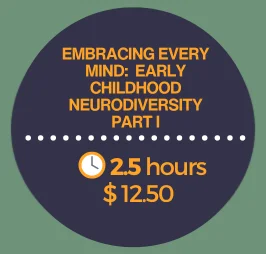
Embracing Every Mind: Early Childhood Neurodiversity Part I
If you are employed in a state that uses a registry to track professional development hours, you will be able to provide your registry ID (Stars, MOPID, Registry or other ECE ID#) after you have completed the quiz for the course. If you pass the quiz we will report your course completion to the state registry using the registry ID that you provide.
This course provides early childhood educators with a foundational understanding of neurodiversity, an approach that views neurological differences as natural human variations rather than deficits. We will explore common neurodevelopmental profiles often encountered in early childhood settings. We also explore common misconception about neurodivergent children. The course emphasizes embracing each child’s unique strengths and challenges. Course length – 2.5 hours.
The course helps answer the following questions:
-
What is Autism Spectrum Disorder?
-
What is Tourette Syndrome?
-
What are some common misconceptions about neurodivergent children?
Participants who successfully complete this course will:
-
Be able to differentiate between typical and atypical developmental presentations in young children, specifically identifying key characteristics of Autism Spectrum Disorder (ASD) and Tourette Syndrome (TS) in an early childhood context.
-
Implement practical, inclusive strategies and accommodations within early childhood settings to support the unique learning and behavioral needs of children with ASD and TS.
-
Learn to promote a strengths-based perspective on neurodiversity, recognizing and celebrating the unique abilities, perspectives, and contributions of children with autism and Tourette’s.